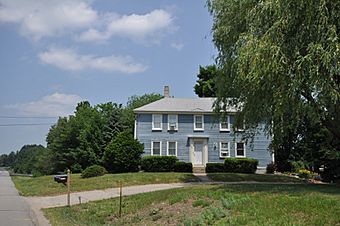Richard Hayes House facts for kids
Quick facts for kids |
|
|
Richard Hayes House
|
|
 |
|
| Location | 184 Gonic Rd., Rochester, New Hampshire |
|---|---|
| Area | 2.6 acres (1.1 ha) |
| Built | 1787 |
| Built by | Hayes, Richard |
| Architectural style | Federal, Vernacular Federal |
| NRHP reference No. | 86000283 |
| Added to NRHP | February 27, 1986 |
The Richard Hayes House is a very old and special home located in Rochester, New Hampshire. It was built way back in 1787. This house is important because it's one of the few homes left from the "Federal period" in the city. The Federal period was a time in American history right after the country became independent. Because of its historical value, the house was added to the National Register of Historic Places in 1986. This is a list of places across the United States that are important to history.
Contents
What Does the Richard Hayes House Look Like?
The Richard Hayes House is a two-story building made of wood. It has a unique L-shape, meaning it looks like the letter "L" from above. This design was part of the original plan when it was built.
Special Design Features
The house looks like it has two parts, or "wings," joined together at a right angle. Each wing has five window sections. The roofs of the wings are angled, making the house look even more interesting. This style is called "vernacular Federal," which means it's a local version of the popular Federal style of architecture. It's a rare and well-preserved example of this style in Rochester.
Who Built the Richard Hayes House?
The house was built in 1787 by a man named Richard Hayes. He came from a nearby town called Madbury.
The Story Behind the House's Design
What's cool about this house is that its L-shape design was planned from the very beginning. Most houses like this were built in two separate steps over time. But Richard Hayes built his home exactly as he wanted it from day one. It even looks a bit like the house where he grew up in Madbury.
How Richard Hayes Got the Land
Richard Hayes built his house on a large piece of land, about 80 acres (which is like 60 football fields!). This land was a gift from his father, Daniel Hayes. Daniel was a well-known landowner and politician in the area. The house stayed in the Hayes family for a very long time, until 1881.



